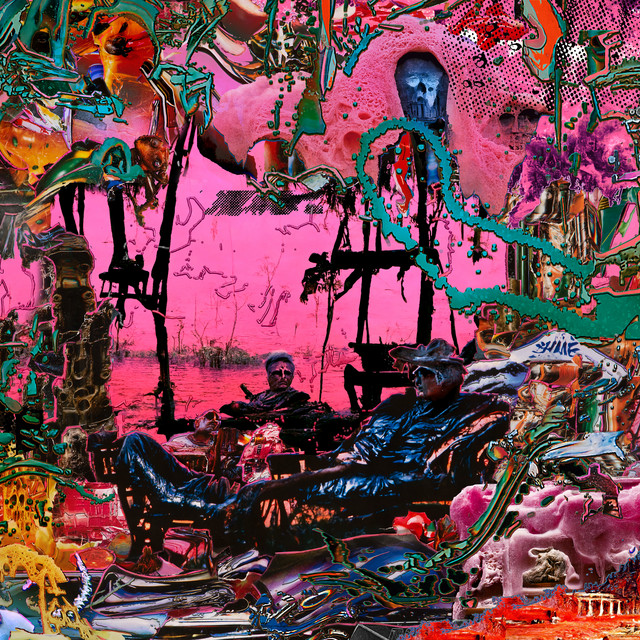
Since their inception in 2017, experimental rockers black midi have gone from strength to strength bringing their eclectic sounds to new ears. In 2022 the trio told Prog how they found new energy to fuel their latest release, Hellfire, and why they certainly won’t be writing a political album any time soon.
Right from the moment they graduated from the celebrated BRIT School for Performing Arts and Technology in 2017, Londoners black midi have been both
a divisive and acquired taste. To their detractors, the trio of singer-guitarist Geordie Greep, bassist and keyboardist Cameron Picton and powerhouse drummer Morgan Simpson are far too clever for their own good, spending way too much time worshipping at the altar of Primus-level mischief.
And yet, for all that, support for black midi has grown at an exponential rate on both sides of the Atlantic. Viewed by some as the natural heirs to the trail forged by King Crimson, their unholy yet deeply satisfying fusion of jazz, math rock, prog and whatever else they choose to throw into the mix has certainly marked them down as one of the most intriguing, challenging and, above all, original bands to have emerged from these shores for quite some time.
The journey taken thus far by black midi hasn’t always been an easy one. Their Mercury Prize-nominated debut album, 2019’s Schlagenheim, heralded a talent with which there would be no half measures. Its 2021 follow-up, Cavalcade, found their trajectory moving further into uncompromising territories and the addition of a relentless touring schedule both home and abroad saw the trio harvesting a whole new crop of multi-generational followers.
But it’s with their latest release, Hellfire, that black midi are likely to be headed for their biggest success to date. A concept album of sorts populated by what the band describes as “scumbags’’ and other ne’er-do-wells, the record is presented as a twisted, infernal cabaret.
“The MC is coming up from behind the curtain introducing everything,” says Geordie Greep of the album’s structure. “Then you have the main album and then the conclusion.”
Hellfire is both a provocative and evocative experience, bringing to mind the contemporary concerns of famine, war, pestilence and death while eliciting feelings of tension, fear and anxiety. Could it be viewed as a bizarre soundtrack to the here and now?
“No, no,” says Greep emphatically. “Since the beginning of the band, there’s been a conscious decision not to reflect politics or current events.”

For bassist Cameron Picton, any references to specific current events threaten to date and damn the music into irrelevance just a few years down the line. Their job, as he sees it, is to tap into broader truths: “The most cringey political stuff ages terribly. We invent another scenario, which is more universal. And then you make something that has way more impact with a much wider scope with what you’re saying.”
Geordie Greep warms to the theme as he explains the appeal of writing from the point of the view of the antagonists at the heart of Hellfire.
“Basically, any kind of antihero or villainous character gives the opportunity to live vicariously through them,” he expounds. “And they have a kind of endearing streak, which is what you want.”
Adds Picton: “We have three or four minutes to tell a story, so we might as well make it fun and blow it out of proportion.”
But if they’ve been having fun with the material, the machinations of the music industry – specifically the cycle of writing, recording and touring and then doing it all over again – almost threatened to derail their wagon. By their own admission, the pressures of becoming professional musicians were beginning to take their toll. Despite having youth on their side – black midi were barely out of their teens when Schlagenheim landed – they were ill-equipped to deal with a punishing international touring schedule.
“The last time we’d been on tour, we weren’t really enjoying it that much because we were playing the same old things again and again,” says Greep.
“It wasn’t a particularly good tour,” nods Picton in agreement. “The weather was shit, and we were really tired and fed up.”
And then, without warning, a form of respite appeared out of the blue. While the global pandemic brought the world to a standstill, the enforced break gave black midi the chance to recalibrate and refresh themselves before the threat of grinding to a total halt became a reality. Crucially, the pause gave the band the opportunity to completely reboot their modus operandi, a process that’s seen them create their most coherent and accessible album in the shape of Hellfire.
“Part of me thinks that if it wasn’t for the time off, there might have been some sort of burnout,” bristles drummer Morgan Simpson at the memory. “We were exhausted by the end of 2019. That was a really difficult period for us.”
“Our last two albums, Cavalcade and Hellfire, wouldn’t have been made without coronavirus,” admits Greep. “We didn’t know that it would be an indefinite period of time off, so it meant a complete opportunity to overhaul what we do; to kind of think from the ground up. Why are we doing this? What’s the reason?
“You can’t overstate what an opportunity that is, what a position that is to be in, so let’s make the most of it. Let’s do something that we can actually really be proud of!”
Crucially, the downtime saw black midi rejecting the improvised approach of their debut in favour of something approaching discipline, form and singular decision-making.
“We really wanted to change things up,” says Greep. “We hadn’t been successful with making new material with the method that we used on the first album. We started doing things much more individually.
“We just found it to be a much more successful method of getting things done more quickly, because when you get together and you kind of democratically vote on every chord and every note, then you just end up nowhere. When you’re all three in a room then it’s easy to just overthink every single decision on a song.”

Almost uniquely for black midi, the new approach in creativity, coupled with the restrictions that prevented them from going out on the road, meant that the songs developed in the studio rather than the stage.
Says Simpson: “We hadn’t played that many shows before we recorded Hellfire, so it meant that when we actually got into the studio, we were only thinking about the studio setting and maximising that as much as possible; compared to the first record, which was completely the other way in terms of playing those songs for a year-and-a-half, day in, day out.”
It’s precisely these self-imposed challenges that keep black midi from sliding into mediocrity.
“We keep each other motivated,” reveals Simpson. “That’s always been a pillar of the band: not resting on your laurels. It’s a cliché to say, but I think that’s something we really try and implement day to day, whether it’s gig to gig and changing up the set in a way that means that we’re playing a song that we haven’t played in a month, and we just put it in the set. We’re like, ‘Fuck it! Let’s give it a go!’ I think that’s the sort of big motivation.”
Theirs is not the path of least resistance; it’s almost as if the only way they can move forward is by working out solutions to the most difficult of problems, most of them self-imposed.
Simpson grins: “The US tour we just did was probably the point where it felt like we’d really landed somewhere, in the sense of feeling comfortable enough with the tunes. Almost comfortable enough with the songs that we can make ourselves feel uncomfortable. It feels more natural, doesn’t it?”
Indeed it does. And while black midi are striking out in new directions, that gap between those who are already on board and those who aren’t is getting narrower all the time.







